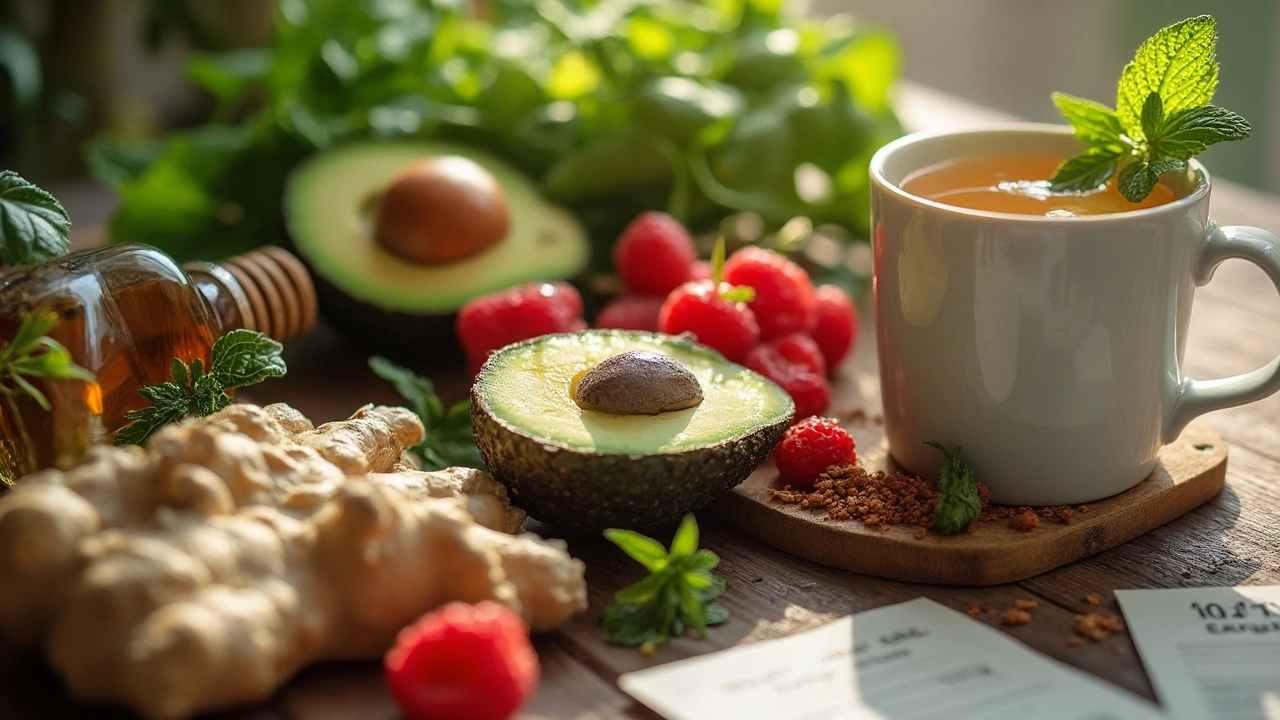If you’ve ever felt that tightness in your chest or had a cough that just won’t quit, you know how rough lung inflammation can be. It doesn’t just zap your energy—sometimes it makes breathing feel like you’re climbing a flight of stairs with a bag of rocks. The tricky thing? Lung inflammation isn’t just about infections; allergies, air quality, and even what you eat can make it worse.
Most folks think you need strong meds right away, but some old-school remedies can really help cut down the swelling and irritation. We’re talking about things you probably have in your kitchen or can grab at any grocery store. Think honey, turmeric, and even a bowl of warm soup. Not hard, not expensive, and while these won’t replace your doctor, they can make a real difference when your lungs are on fire.
Stick around as I run through the why, what, and how—the stuff that actually helps when your lungs need a break. And yeah, I’ll flag things that sound healthy but can actually make things worse. Ready to breathe a little easier at home?
- Why Lung Inflammation Happens
- Foods That Fight Inflammation
- Home Remedies Worth Trying
- What to Skip or Avoid
- Building Lung-Friendly Habits
Why Lung Inflammation Happens
Lung inflammation sounds scary, but it’s really your body trying to protect you. When something irritating gets into your lungs—like pollen, cigarette smoke, or germs—your immune system turns on. It floods your airways with fighter cells, and that leads to swelling, extra mucus, and all the stuff that makes breathing feel tough.
The tough part is, anything from a cold to pollution can set it off. Lung inflammation isn’t just about catching a virus, either. Folks with allergies or asthma get it when their body freaks out over things like dust mites or pet dander.
- Infections: Things like the flu, pneumonia, or even a bad cold are obvious triggers. Your lungs try to push out the bugs with coughs and mucus, and that causes swelling.
- Pollution and Smoking: Breathing in dirty air or cigarette smoke slaps your lungs with chemical junk, and they react by swelling up to protect you—which actually makes things worse.
- Allergies: Your immune system sometimes mistakes harmless stuff (like pollen) for dangerous invaders—that’s how allergies mess with your lungs.
- Autoimmune Issues: With conditions like rheumatoid arthritis or lupus, the body’s immune system can attack the lungs by mistake, leading to ongoing inflammation.
Here’s a breakdown of some common causes people run into:
| Cause | Percent Linked to Lung Inflammation |
|---|---|
| Viral Infections (cold/flu) | ~40% |
| Environmental (pollution, smoke) | ~30% |
| Allergies | ~20% |
| Autoimmune | ~10% |
One more thing—your body doesn’t just flip a switch and turn it off. Even after the original problem is gone, the lungs can stay irritated. That’s why home remedies to calm things down actually matter. The sooner you help your lungs chill, the faster you’ll start breathing easy again.
Foods That Fight Inflammation
When you’re dealing with lung inflammation, what you put on your plate can make a real difference. Certain foods naturally help cut down swelling and support respiratory health. Forget mystery superfoods—these are things you’ll actually find at your local grocery store, and maybe in your fridge right now.
- Garlic: Famous for its immune-boosting punch, garlic’s compound allicin helps reduce inflammation in the airways. Toss it into soup or roast it with veggies.
- Turmeric: This yellow spice isn’t just for curry. Turmeric’s active ingredient, curcumin, can lower inflammation in lung tissue. Try mixing it with warm milk or sprinkling on rice.
- Ginger: Ginger tea is more than a comfort drink—it helps relax the muscles around the airways and tamps down on inflammation.
- Berries (like blueberries and strawberries): Loaded with antioxidants, berries can help protect your lungs from damage and keep swelling in check.
- Leafy greens: Spinach, kale, and swiss chard have vitamins and antioxidants that support lung function and reduce irritation.
- Fatty fish (salmon, sardines, mackerel): Packed with omega-3s. These healthy fats can cut back on lung inflammation, especially if you have asthma or other chronic issues.
- Olive oil: A solid choice for cooking or dressing salads, olive oil’s healthy fats help fight off inflammation through natural compounds called polyphenols.
A small study from 2022 showed that people eating more omega-3 fats had about 20% lower markers of lung inflammation, especially if they were dealing with allergies or chronic coughs. That’s a pretty easy swap—think grilled salmon or canned sardines a few times a week.
If there’s one thing to remember: the closer your food looks to how it grew in nature, the better it is for taming inflammation. Keep it simple. Reach for whole foods, colorful produce, and healthy fats—your lungs will thank you.

Home Remedies Worth Trying
When your lungs are acting up, there’s no need to jump right into heavy-duty meds if things aren’t severe. In fact, some home remedies can take the edge off lung inflammation. We’re not talking magic cures, but plenty of research shows these options make breathing a little easier and help your body calm down.
- Steam Inhalation: If your chest feels tight, a bowl of hot water does wonders. Drape a towel over your head, lean in, and inhale the steam for five to ten minutes. This helps loosen up mucus and soothes swollen airways. You can toss in a few drops of eucalyptus oil—just don’t go overboard because it’s strong stuff.
- Turmeric Milk: Turmeric is famous for its anti-inflammatory power. Stir half a teaspoon into a cup of hot milk (plant-based is fine too) and sip it before bed. That punch of curcumin might help your body keep inflammation at bay.
- Honey and Ginger: Both are natural favorites. Mix a spoonful of honey with grated fresh ginger and warm water. Not only does this calm coughs, but it also chills out irritated lung tissue. Bonus: Honey is proven to soothe throats without making you drowsy like some syrups.
- Garlic: Raw garlic sounds intense, but it’s packed with compounds that can help thin mucus and reduce swelling in your lungs. If you can’t eat it raw, chop up a clove and add it to soup or a sandwich.
- Warm Fluids: Soup, tea, or just warm water—staying hydrated keeps mucus thin and easier for your body to clear. Warm drinks also feel great when your chest feels irritated.
You can even try breathing exercises like pursed-lip breathing; it’s simple and relieves shortness of breath fast. Don’t stress about doing it perfectly—just aim to slow down your breathing and focus on longer exhales.
| Remedy | Main Benefit | How Often |
|---|---|---|
| Steam Inhalation | Loosens mucus | 1-2 times/day |
| Turmeric Milk | Reduces inflammation | Nightly |
| Honey & Ginger | Soothes cough | 2-3 times/day |
| Garlic | Fights swelling | Daily |
| Warm Fluids | Keeps mucus thin | All day |
Dr. Lena Nguyen, a pulmonologist, once said,
"While medications have their place, traditional home remedies like honey and steam are backed by good science and can help manage respiratory health at home."
It’s worth noting, though, that if you ever start to feel worse or have trouble breathing, home remedies won’t replace a doctor. These tips are about making life a little easier, not dodging real emergencies.
What to Skip or Avoid
When you’re trying to cut down on lung inflammation, what you leave out matters as much as what you add in. Some habits and foods can actually make swelling and irritation much worse. Let’s talk about the biggest culprits.
- Skip cigarettes and vaping. Probably goes without saying, but even secondhand smoke will wreck your lung health and make inflammation stick around way longer. Smoke signals to your immune system that it’s time for another round of ‘fight or flight’—which is the last thing you want.
- Avoid processed foods and fried stuff. See those hot fries or microwave snacks? They’re usually packed with trans fats, added sugar, and salt. These can boost inflammation all through your body, including the lungs, according to real nutrition research published in recent years.
- Watch out for dairy if you’re sensitive. Some people notice that milk, cheese, and ice cream make their throat or lungs feel thicker with mucus. You don’t have to cut out all dairy, but if you notice things get worse after a milkshake, trust your gut.
- Say no to strong chemical cleaners. Sprays and disinfectants with ammonia or bleach can irritate your airways quick. Ventilate your place well if you need to clean, or switch to natural options like vinegar and baking soda.
- Avoid outdoor activity when air pollution is high. Air quality apps aren’t just for weather nerds—they’re super useful if you’ve got inflamed lungs. On high pollution days, small particles in the air tick off your breathing tubes. Make indoor plans when the AQI is up.
To show just how much the little choices can matter, here’s a quick look at how some habits impact lung inflammation:
| Behavior | Inflammation Risk |
|---|---|
| Smoking cigarettes | Very High |
| Eating fast food daily | High |
| Using air filters at home | Lowered |
| Breathing in cleaning fumes | Medium to High |
| Mild exercise, indoors | Lowered |
Skip the stuff that stirs up your lungs and you’ll be a step ahead in easing lung inflammation. The best changes are small and steady—your lungs will definitely thank you.

Building Lung-Friendly Habits
You don’t have to overhaul your life to see a difference in your lung inflammation. Just a handful of practical changes can seriously boost your respiratory health and help keep your lungs happy long-term. Let’s break down what actually pays off from day to day.
- Stay Hydrated: Drinking plenty of water helps thin out mucus, so your lungs can clear junk out more easily. Aim for eight glasses, but even sipping a bit more than usual counts if you spend time somewhere dry or smoky.
- Get Moving: Exercise isn’t just for your heart—regular movement helps expand your lungs, improves oxygen flow, and supports your body’s ability to fight off inflammation. Brisk walks, light cycling, or even dancing around your living room work.
- Avoid Smoke and Pollutants: Smoking and secondhand smoke are a recipe for disaster when it comes to lung inflammation. Try to steer clear of smoky environments. If air quality is a problem in your area, HEPA air purifiers and keeping windows shut on bad days can help.
- Practice Nose Breathing: Breathing in through your nose filters and warms air before it hits your lungs. Sounds simple, but this small thing helps reduce irritation from dust and dry air.
- Manage Indoor Air: Dust, dander, and cleaning fumes can all fire up lung inflammation. Using unscented cleaning products and running an air purifier can minimize triggers. Even cracking a window for five minutes a day helps clear stuffy air.
Quick fact: According to the American Lung Association, people who get 150 minutes of moderate physical activity per week report better lung function and fewer flare-ups.
| Habit | Potential Benefit |
|---|---|
| Hydration | Thins mucus, easier breathing |
| Exercise | Boosts lung capacity, lowers inflammation |
| Air Quality | Reduces exposure to triggers |
| Nose Breathing | Less dust and dryness in lungs |
Don’t just take my word for it, though. Check out what the experts say:
"Avoiding exposure to irritants and staying physically active are two of the best ways people can protect their lung health at home." — Dr. Albert Rizzo, Chief Medical Officer at the American Lung Association
Stacking even a few of these lung inflammation tricks works better than going all-or-nothing. Start small, be consistent, and your lungs will thank you.



shashi Shekhar
April 28, 2025 AT 11:41Oh sure, just drizzle honey on everything and expect your lungs to take a vacation-because that’s how biology works, right? Meanwhile, the “big pharma” crowd is probably watching and nodding.
Marcia Bailey
April 28, 2025 AT 12:14Great point about turmeric! Adding a pinch to warm milk before bed can really help calm the airway inflammation. Keep it up! 😊
Hannah Tran
April 28, 2025 AT 12:56When you consider the bronchial epithelium’s response to pro‑inflammatory cytokines, omega‑3 fatty acids act as a competitive inhibitor of the NF‑κB pathway, thereby attenuating mucosal edema. Incorporating fatty fish two to three times weekly provides the requisite EPA/DHA to modulate this cascade effectively. Trust me, your lungs will thank you.
Crystle Imrie
April 28, 2025 AT 13:26Sure, steam works… if you enjoy feeling like a sauna.
Shelby Rock
April 28, 2025 AT 14:02Life’s a breath, and sometimes the simplest vapor can remind us that every inhalation is a tiny miracle-definately worth a few minutes of steamy reflection.
Dhananjay Sampath
April 28, 2025 AT 14:36Indeed, the act of inhaling warm, moist air; it not only loosens mucus, but also stimulates the ciliary motion, which, in turn, enhances mucociliary clearance; additionally, the slight humidity reduces airway hyper‑responsiveness, making breathing feel noticeably smoother.
kunal ember
April 28, 2025 AT 15:26First, let’s acknowledge that the human respiratory system is a marvel of evolutionary engineering, designed to extract oxygen from the atmosphere while filtering out countless irritants that constantly bombard the airway lining. When inflammation sets in, the delicate balance between pro‑inflammatory mediators and anti‑inflammatory agents is disturbed, leading to edema, excess mucus production, and the dreaded sensation of chest tightness that many of us have experienced during a bad cold or allergic episode. One of the most accessible ways to tip the scales back toward equilibrium is through dietary modifications that prioritize anti‑oxidant rich foods, such as berries, which are packed with flavonoids that have been shown in multiple studies to reduce oxidative stress in pulmonary tissue. Similarly, garlic contains allicin, a sulphur‑containing compound that not only exhibits antimicrobial properties but also modulates the immune response, thereby decreasing the release of inflammatory cytokines like interleukin‑6 and tumour necrosis factor‑alpha. Turmeric, especially when paired with a pinch of black pepper to enhance bioavailability, provides curcumin, a polyphenol that directly inhibits the cyclooxygenase‑2 enzyme, a key player in the synthesis of prostaglandins that contribute to airway swelling. Incorporating fatty fish such as salmon or sardines introduces omega‑3 fatty acids, particularly eicosapentaenoic acid (EPA) and docosahexaenoic acid (DHA), which compete with arachidonic acid for incorporation into cell membranes, resulting in the production of less inflammatory eicosanoids. Hydration, often overlooked, is another cornerstone; maintaining adequate fluid intake keeps the mucus membrane hydrated, reducing its viscosity and making it easier for the cilia to transport mucus out of the lungs. Warm liquids, such as herbal teas infused with ginger or simply hot water with a squeeze of lemon, provide both soothing heat and additional phytochemicals that can alleviate bronchial irritation. Steam inhalation, when performed safely with a towel draped over the head and a few drops of eucalyptus oil, delivers volatile compounds that can relax the smooth muscle of the bronchi, offering short‑term relief during acute episodes. Complementary breathing exercises, like pursed‑lip breathing or diaphragmatic breathing, empower patients to consciously control their exhalation, thereby reducing airway resistance and improving gas exchange. It is also prudent to minimize exposure to known irritants, including tobacco smoke, indoor pollutants, and high‑particulate outdoor air, by using air purifiers and keeping windows closed on days with poor air quality indices. Regular moderate‑intensity aerobic activity, such as brisk walking or cycling, has been documented to increase lung capacity and improve the efficiency of the respiratory muscles, which can counteract the deconditioning often seen in chronic inflammatory states. Lastly, consistency is key; adopting these habits incrementally and maintaining them over weeks rather than seeking a quick fix will yield more sustainable improvements in pulmonary health. In summary, a holistic approach that blends nutrition, hydration, environmental control, and gentle physical activity stands as the most effective strategy for reducing lung inflammation without over‑reliance on pharmaceuticals.
Kelly Aparecida Bhering da Silva
April 28, 2025 AT 16:07While all these “natural” tips sound fine, don’t forget that the pharmaceutical giants are lobbying behind the scenes to keep us dependent on costly inhalers-so sticking to home remedies is also a patriotic act of resistance.
Michelle Dela Merced
April 28, 2025 AT 16:41Exactly! 🙌 Nothing says “love for our country” like a DIY turmeric latte that beats a pricey prescription any day. 🌿💪
Alex Iosa
April 28, 2025 AT 17:31It is incumbent upon every responsible citizen to scrutinize the sources of information presented as health advice, for the propagation of unverified remedies can undermine public trust and inadvertently serve the agenda of entities seeking to profit from our ailments.
melissa hird
April 28, 2025 AT 18:12Indeed, because what the world truly needed was another eloquent reminder that “common sense” is a luxury reserved for the uninformed, and that only the most erudite among us can decipher the mysteries of a humble cup of honey‑laden tea.
Mark Conner
April 28, 2025 AT 19:02Look, we’ve got the best food and the best air if we just keep it in our own backyard-no need for foreign “miracle” diets.
Charu Gupta
April 28, 2025 AT 19:44While enthusiasm is commendable, it is essential to note that “best food” is a subjective claim; scientifically, balanced nutrition encompassing a variety of nutrients yields the most consistent health outcomes. 🍎📚
Abraham Gayah
April 28, 2025 AT 20:17Ah, the perennial myth of the singular “best” cuisine-such a simplistic narrative! One must appreciate the nuanced tapestry of global gastronomy, wherein the interplay of flavors, textures, and cultural histories elevates the palate far beyond the crude binaries of nationalism.
rajendra kanoujiya
April 28, 2025 AT 21:07Even if we accept that tapestry, the truth remains that many of those “global” ingredients are just marketing hype; sticking to locally sourced staples is the only verifiable way to ensure genuine health benefits.